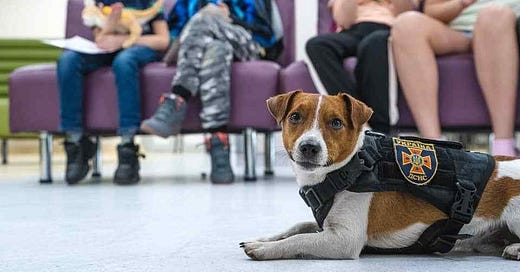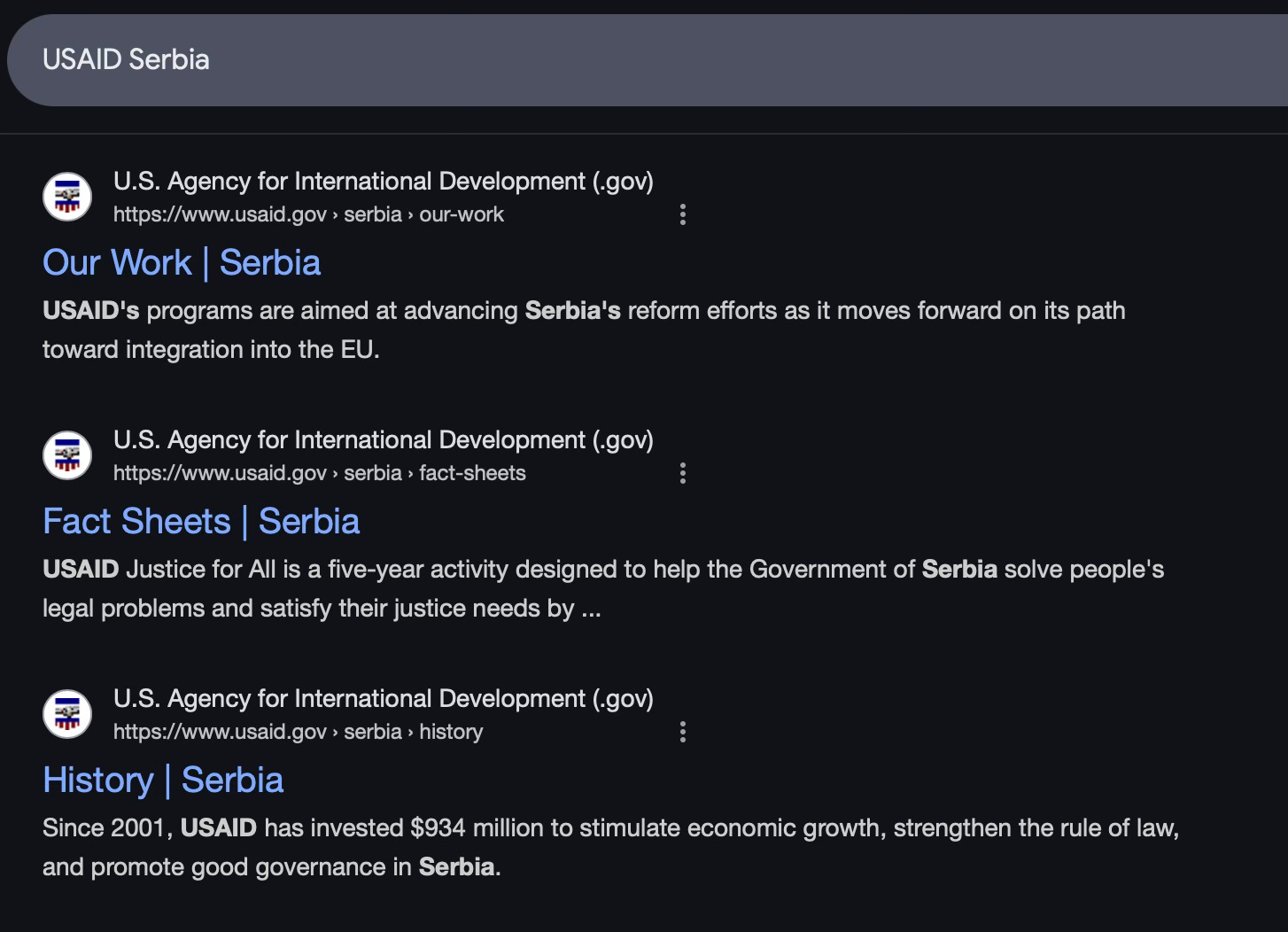How Suspending USAID Puts Europe's Security At Risk
Why a cartoon about the adventures of a bomb-sniffer dog makes the continent stronger.
Author’s Note: I will be at the Munich Security Conference on February 14-16, reporting for my day job at The Moscow Times. If you’re going as well and work on European security, the war in Ukraine, and the future of Russia, please get in touch. I’d love to hear from you and potentially arrange a conversation.
US President Donald Trump and his allies haven’t exactly kept quiet about their belief Europe needs to pull its own weight for its protection. The founding principle of this blog agrees with that sentiment to one extent. Now Trump has made the matter worse by ordering a 90 day freeze of the work of the United States Agency for International Development (USAID), which has now been de facto absorbed into the State department and faces an uncertain future.
Exceptions to the freeze quickly followed to allow for the flow of “lifesaving” aid. While acute aid is crucial for people in need, suspending support for less immediate needs is short sighted. It leaves initiatives focused on building long-term political and social stability stranded, jeopardizing conditions critical for the security of European nations affected by war or the lingering affects of authoritarian rule, and the security of the continent as a whole.
While Ukraine is seeking to use EU funds to replace the gulf America is leaving behind, it is unlikely that the bloc will be able to muster the sum required to replace all the support lost thanks to its own financial pressures and bureaucratic hurdles.
The initiatives explored in this article only scratch the surface of the range of programs that were able to operate thanks to USAID. I wish I could provide you with exact figures, but USAID’s financial reports have been wiped from the internet ayongwith the rest of the agency’s website.
The most obvious impact is in Ukraine. Suspending USAID doesn’t stop military aid flowing — though it arguably doesn’t bode well — but it still throws the country’s future into question but cutting off the flow of money that allowed Ukraine’s state to continue running and supports programs that will play their part in building a stable future.
Most USAID to Ukraine went toward topping-up the national budget, allowing Kyiv to keep paying salaries to state employees. The USAID-led Agri-Ukraine program is thought to have generated $1 billion for Ukraine’s cash-strapped economy over two years by
Rubio’s exemptions for life-saving programs are welcome but (like much of the West’s support for Ukraine) shortsighted. The leading cause of death for children in war zones is from explosive weapons, including land mines and unexploded devices.
A colorful USAID-backed initiative trying to lives is Patron the Dog, the cartoon adventures of a real-life sapper dog aimed at entertaining young children while teaching them about wartime safety. In a social media post, the dog’s handler said they did not know whether they could continue producing the show, episodes of which regularly top 1 million views on YouTube, without the support of USAID.

What does a cartoon for seven year olds have to do with security? Every child saved from having their limbs blown off or or their brains pummeled by a close-range shockwave from inadvertently touching a landmine or unexploded shell is a child who will not have to rely on charities or government financial support. A generation able to live as normal a life as possible is a generation that will be more resilient to threats from outside and within and can build a stronger Ukraine and, as a result, Europe.
Another group affected by the aid cut-off is veterans. The charity Veteran Hub, which provides psychological and legal support to veterans and their families, had to suspend its hotline at the end of January. A helpline doesn’t stop people from starving, but that does not mean it cannot save lives.
Furthermore, how Ukraine handles its veterans will be a significant challenge during reconstruction1. According to Kyiv’s own Veterans Ministry, 10% of Ukraine’s population could consist of veterans and their families by the end of the war. Over half of them are thought to need to find new jobs once they return from combat. 5-6 million underemployed people in need of psychological support and social services will put an enormous strain on Ukraine’s state and society, even if they are unarmed and have no grievances about their treatment. As with protecting children from landmines, ensuring that Ukraine’s veterans are as well prepared as possible to reintegrate into civilian life is an investment in a stable Ukraine and continent.
Ukraine’s independent media has also been hit hard by the loss of American aid. The investigative outlet Slidstvo, which specialises in exposing corruption, was reliant on US grants for 80% of its operations and is currently trying to replace that loss with specialist media funding drives and private donations. BIHUS and Ukraïner have also been left struggling for funds.
We journalists are often accused of taking a solipsistic approach to our industry. After all, newspapers are hardly emergency aid (as much as it pains me to admit). But a functioning press that operates free of government control is rightly recognized as a key indicator of a country’s freedom. Despite having made strides in recent years, Ukraine still suffers from corruption that Vice President J.D. Vance readily used to argue against sending military aid (including referencing a Russian disinformation narrative about Ukrainian elites buying yachts with donations).
It is, of course, far from desirable that corruption-busting investigators have to rely on USAID to operate. But withdrawing that support increases the space for Russian and Chinese money to fund their own interests, which often include destabilizing Europe.
Take Moldova, which narrowly returned Pro-EU Maia Sandu to the presidency last year despite an election rife with alleged Russian interference. Its proximity to Ukraine and the presence of Russian troops in the breakaway Transnistra region make it vulnerable to Russian aggression and pressure, the ripples of which could affect the whole continent. The USAID freeze pulled the rug out from under Promo-LEX Association, an NGO that monitors elections and political financing.
Oxana Greadcenco, director of the independent Moldova.org outlet told the AP that foreign funding for media organizations provided an important counterweight against Russia’s efforts. “Being aware of how much Moldova depends on U.S. funds, not just NGOs and the press but also local municipalities, many public institutions … this is a shock for everyone,” she added.
Googling “USAID [country]” provides glimpses of the range of projects from strengthening civil society and facilitating investment schemes in Central Europe and the Balkans to supporting refugees on Europe’s periphery in which USAID had a hand.
As with military support, Europe has not become self-sufficient in the realms of civil society and NGOs. Both politically, as its presence provides as easy stick for populists to beat journalists and campaigners critical of their regimes, and practically: anyone who works for organizations reliant on grants will tell you how much time and energy securing funding takes up. But the sudden loss of support has left people doing important, under-paid work scrambling for support that might never come, leaving gaps in Europe’s social fabric that populists, Russia and China will be all to happy to explode.
Simon Shuster, The Showman: Inside the Invasion That Shook the World and Made a Leader of Volodymyr Zelensky(HarperCollins, 2024).




